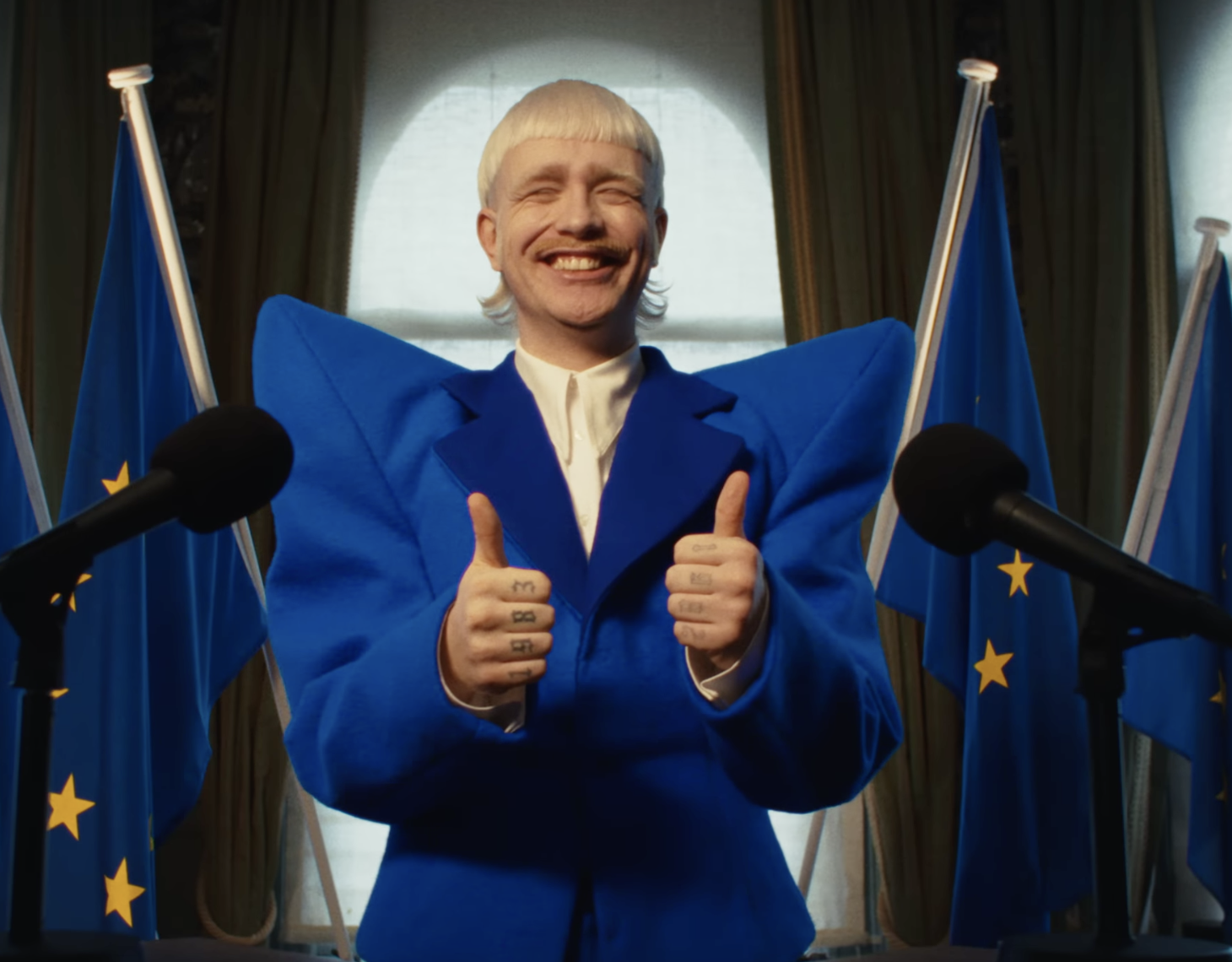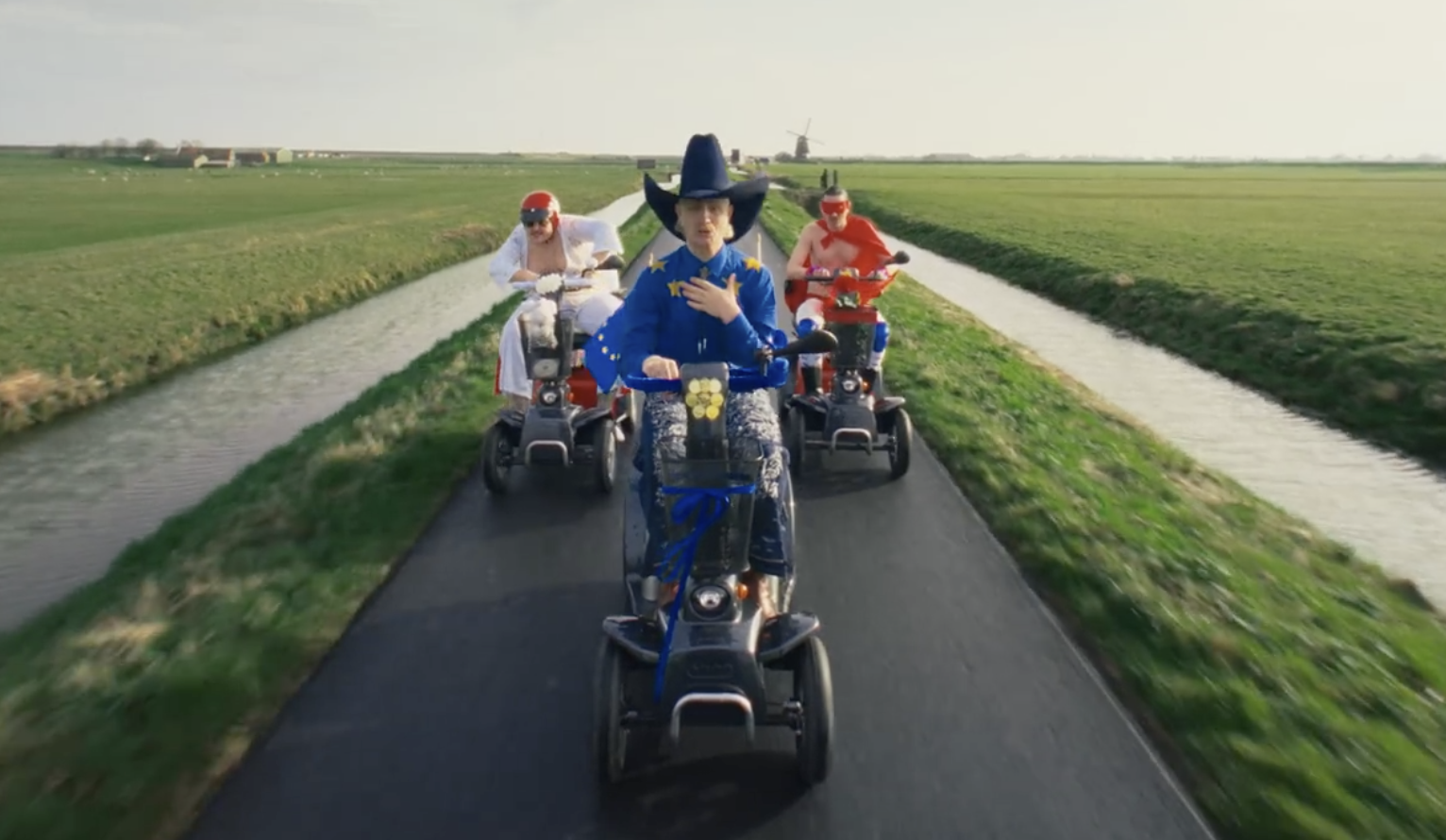▶ listen to this post
Eurovision nationalism
The Dutch submission for Eurovision is a song called ‘Europapa’ by Joost Klein. It’s a cunningly catchy tune accompanied by a spell-binding and garish videoclip. The entire thing seems tuned to give uncomplicated pleasure and satisfaction, like candyfloss you give to a child. But it adds to that a sense of nostalgia and, ultimately, I think, nationalist angst. And that’s why it should put us on high alert.
Musically the song reminds me of the happy hardcore revivalism celebrated and perfected in the work of Danny L. Harle. But it’s important to look behind the music. There is an undeniably political message communicated through the song: “Europe is in danger, and it is worth fighting for!”

A triumph of the will?
Every introduction to political propaganda will cover Leni Riefenstahl’s Triumph of the Will, a film shot to document the 1934 Nazi Party Congress in Nuremberg. The reason this film is always discussed is that it shows how the immediate appeal of art can be exploited to shape people’s political consciousness. What is significant about Riefenstahl’s film is that at the time it was a visually stunning piece of cinema that served as shiny wrapping for a toxic political reality.
I don’t want to go so far as to say that the Dutch submission for Eurovision 2024 is a new Triumph of the Will. But the principle is the same. Produce something that immediately appeals to masses of people because of its form, so that a political reality will be cast in a favourable light. A sugar-coated pill, so to speak.
Especially if you take the video clip to be an integral part of the song, it’s hard to deny ‘Europapa’ is a cavalier celebration of Europe. The flag of the Union, a circle of yellow stars against a blue backdrop, crops up in every other frame. Europe is represented by a large house cobbled together out of different buildings and styles. Symbols of national identity, such as different European languages or references to local dishes, have a prominent place. In particular there’s a celebration of Dutch national symbols: the windmill, the lifeless grass deserts of Holland, and the happy hardcore and Gabber scenes—musical subcultures that will awaken childhood or adolecent memories in the song’s intended audience in The Netherlands.
Toxic Europeanism
The message of ‘Europapa’ is toxically pro-European. Toxic because there’s little to celebrate. Europe is killing thousands of people at its borders, denying access to refugees from war zones or climate chaos it helped create. Europe everywhere is showing signs of fascism, with fascist and far-right politicians either in government or knocking at its doors. Europe is actively supporting Israël’s genocide in Gaza. There’s nothing to be proud of here.
Yet as is usual for nationalistic propaganda, ‘Europapa’ completely ignores the violence carried out in name of Europe. Instead, it portrays Europe as having to race against other ‘super-powers’ of the world.
The portrayal is quite literal. In the video there’s a central scene in which Klein is in a mobility scooter being chased by two other people in similar vehicles. Klein is draped in the European flag wearing a cowboy hat. The other two are dressed in an Elvis costume (the United States ), and a superhero costume in the colours of the white-blue-red flag of the Russian federation. It’s a racing game like Mario Cart. But a game console menu early on in the video makes clear that it’s ‘real life’. Winning, apparently, requires the EU to stay ahead of others, the US and Russia in particular.

I would have thought that ‘winning’ required ensuring a dignified treatment of refugees in all member states, the formation of a strong anti-fascist coalition, climate justice, and an end to the support of Israël’s genocide in Gaza. I would have thought that winning required victories of diplomacy, collaboration and solidarity. Instead, Klein’s song portrays Europe’s predicament as a race. If we may believe the video, Europe has a chance of becoming ‘first’.
Supra-nationalism
It is not a surprise to find politics in Eurovision, given that the entire festival each year ends up being a circus-like reflection of current affairs. It’s not even surprising to find an overt celebration of Europe at Eurovision. But at this moment in history, I think the propaganda is especially pernicious.
Reading the available commentary, so far it has mainly been far right nationalists that have spoken about the propagandistic character of Klein’s song. Nationalists everywhere in Europe see the European Union as a threat to their own national identity. The project of the European Union appears to them as a kind of anti-nationalism, a kind of globalism.
But I think these far-right nationalist critics misunderstand what the song and the accompanying video actually achieve. As the song’s narrow celebration of Europeanism shows, ‘Europapa’ is not at all anti-nationalistic or globalistic. Quite the contrary. It promotes a kind of supra-nationalism, a kind of European exceptionalism.
My own attitude towards the European Union is ambivalent. I think that European unity and solidarity is crucial to counteract nationalistic and imperialist movements in its member states. That’s good. But as soon as Europe itself becomes a vehicle for nationalism and imperialism, as it has become, I see dark clouds on the horizon. And those clouds have been gathering for a while now.
A misplaced sense of angst
The initially joyful song seems to end on a note of darkness and angst. The final scenes show the large cobbled together house on fire. The decoded warning: “Europe is on fire”. Never mind the rest of the world. This is where the feelings of nostalgia and childish happiness evoked by the video, at least in a Dutch audience, are moulded into a felt need to preserve and protect. Egoïsm and political selfishness. Parochialism.
And even the far-right critics of ‘Europapa’ I’ve read end up exactly there: a call to clench onto something what allegedly once was. Either way, then, this song reinforces a regressive and nostalgic nationalism at a time where both Europe and The Netherlands are clearly on the wrong side of history.